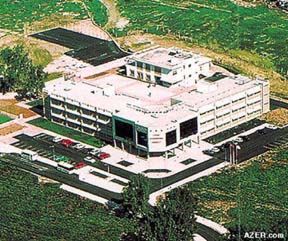|

Winter 2000 (8.4)
Page
33
Linking Through Education
North
Cyprus Aids Azerbaijani Students
Even
though Turkish Republic of North Cyprus has limited resources
itself, the Turkish Cypriots have found something to offer Azerbaijani
youth - a solid education. The government has already provided
21 scholarships to Azerbaijani college students for study at
one of their five English-language universities.
"We are granting $7,500 scholarships," Turkish Cypriot
Representative to Azerbaijan Ayfer Said Erkman says. "This
amount covers tuition, accommodations and airfare." These
scholarships, paid for by the Turkish-Cypriot government, are
also awarded to students from other Turkic countries, including
Turkmenistan and Uzbekistan.
  Altogether, the Turkish
Cypriot universities have 25,000 students coming from 67 countries
and 1,600 professors from 27 countries, including the U.S., England,
Taiwan and Turkey. Altogether, the Turkish
Cypriot universities have 25,000 students coming from 67 countries
and 1,600 professors from 27 countries, including the U.S., England,
Taiwan and Turkey.
Photo: Scholarships are offered
by the government of North Cyprus for Azerbaijanis to study in
English language at five universities.
Erkman, himself a part-time lecturer at one of the universities,
says that degrees from North Cyprus universities are accredited
and accepted internationally. "Our diplomas are recognized
all over the world," he explains. "Anyone who graduates
from our universities can easily go on to get their M.A. or Ph.D.
in England or the U.S."
To apply for scholarships, prospective students are interviewed
in Baku. "We prefer first-year university students,"
he says. "We're looking for people who have already shown
that they can succeed at their studies."
Students can choose from five different universities to in North
Cyprus. These universities are located in places such as Famagusta
(Magosa), Lefkosa (in Nicosia) and Girne (in Kyrenia). A new
campus is currently built by Ankara's Middle East Technical University
in the Guzelyurt area (the Greek name for this area is Omorpho).
Approximately 22,000 students will be enrolled in this university.
Education as Island's
Resource
Beginning in 1986, North Cyprus decided to use universities as
a way to draw more revenue to the island. The largest school,
Eastern Mediterranean University, was established that year;
since then it has educated 14,000 students.
So far, The Turkish-Cypriot government has invested $80 million
in the higher education sector of its economy. Erkman believes
that this high-level decision is already starting to pay off:
"Higher education is a new sector in our economy, and it's
already making a significant contribution. The students come
here and spend a lot of money in various sectors; plus their
families come to visit. They're like permanent tourists."
The fact that university instruction is in English reflects the
island's unique history. North Cyprus was conquered by the Ottoman
Turks in 1570-71 and remained under Turkish sovereignty until
it was annexed by Great Britain in 1914. The Greek side of the
island, which is better known for attracting tourists, only has
one university, with instruction in Greek.
Erkman hopes that the connection between Azerbaijan and North
Cyprus will one day become more reciprocal: "For the time
being, the direction is one-sided - from Azerbaijan to Cyprus.
Perhaps in the future we'll find chances to send our students
to Azerbaijani universities and develop exchange programs."
For information about scholarships, Azerbaijani applicants
should contact:
Ayfer Said Erkmen, Representative
Turkish Republic of Northern Cyprus
69 Fuzuli Street, Level 5
Baku, Azerbaijan
Tel: (99-412) 95-93-51
Fax: (99-412) 93-20-86
E-mail: baku._.rep@kktc.baku.az
Thalassemia Connection
After successfully coping with its own thalassemia problem, Cyprus
is now helping Azerbaijan deal with this tragic disease. About
2,000 Azerbaijani children suffer from the genetic blood disorder
known as beta thalassemia. To survive, children often require
transfusions of two to four liters of blood twice a month. This,
in turn, creates another problem caused by excess iron in the
blood which must be removed via expensive Desferal treatments.
The Cyprus government spends about $10,000 per child each year
for this purpose.
In July 2000, Gulnaz Amrahova, President of Azerbaijan's Parents'
Association of Thalassemia, was invited to visit Cyprus to learn
how this small country is effectively managing the disease by
requiring pre-marital testing to see if the spouses carry the
thalassemia trait. If so, the couple has the option to terminate
a pregnancy if the unborn child is identified with this chronic
illness.
In Azerbaijan, and even in the U.S., the life expectancy for
thalassemics is relatively low, but Cyprus has had thalassemics
live to be 40 to 50 years old, one of the highest rates in the
world. Cyprus plans to continue to advise Azerbaijan on this
problem. [For more information, SEARCH for "Thalassemia"
at AZER.com.]
_____
From Azerbaijan
International
(8.4) Winter 2000.
© Azerbaijan International 2000. All rights reserved.
Back to Index
AI 8.4 (Winter 2000)
AI Home
| Magazine Choice | Topics
| Store
| Contact
us
|